
Otto Abels Harbach, born Otto Abels Hauerbach was an American lyricist and librettist of nearly 50 musical comedies and operettas. Harbach collaborated as lyricist or librettist with many of the leading Broadway composers of the early 20th century, including Jerome Kern, Louis Hirsch, Herbert Stothart, Vincent Youmans, George Gershwin, and Sigmund Romberg. Harbach believed that music, lyrics, and story should be closely connected, and, as Oscar Hammerstein II's mentor, he encouraged Hammerstein to write musicals in this manner. Harbach is considered one of the first great Broadway lyricists, and he helped raise the status of the lyricist in an age more concerned with music, spectacle, and stars. Some of his more famous lyrics are "Smoke Gets in Your Eyes", "Indian Love Call" and "Cuddle up a Little Closer, Lovey Mine".
This is a list of notable events in music that took place in the year 1912.
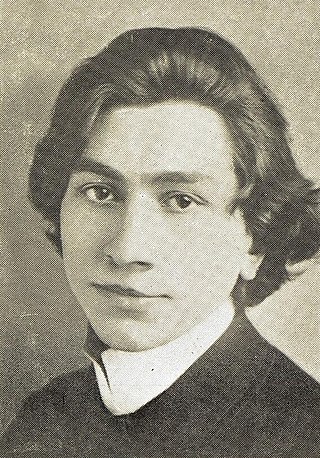
Charles Rudolf Friml was a Czech-born composer of operettas, musicals, songs and piano pieces, as well as a pianist. After musical training and a brief performing career in his native Prague, Friml moved to the United States, where he became a composer. His best-known works are Rose-Marie and The Vagabond King, each of which enjoyed success on Broadway and in London and were adapted for film.

Rose-Marie is an operetta-style musical with music by Rudolf Friml and Herbert Stothart, and book and lyrics by Otto Harbach and Oscar Hammerstein II. The story is set in the Canadian Rocky Mountains and concerns Rose-Marie La Flemme, a French Canadian girl who loves miner Jim Kenyon. When Jim falls under suspicion for murder, her brother Emile plans for Rose-Marie to marry Edward Hawley, a city man.

Little Mary Sunshine is a musical that parodies old-fashioned operettas and musicals. The book, music, and lyrics are by Rick Besoyan. The original Off-Broadway production premiered November 18, 1959 at the Orpheum Theatre in New York City's East Village. Staying in the neighborhood, it moved to the Player's Theatre on June 21, 1961, then, finally, to the Cherry Lane Theatre on March 21, 1962. Closing was Sept. 2, 1962. Combined run was 1,143 performances. It was seen briefly in a West End production in 1962 and has become a popular show for amateur and semi-professional groups in the United States and elsewhere.
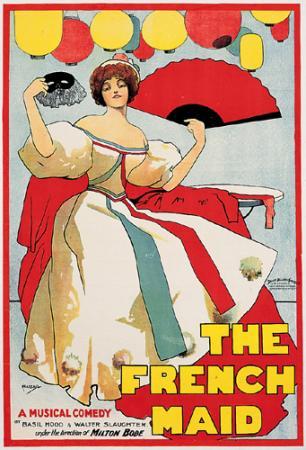
The French Maid is a musical comedy in two acts by Basil Hood, with music by Walter Slaughter, first produced at the Theatre Royal, Bath, England, under the management of Milton Bode on 4 April 1896. It then opened London's Terry's Theatre under the management of W. H. Griffiths beginning on 24 April 1897, but later transferred to the Vaudeville Theatre on 12 February 1898, running for a very successful total of 480 London performances. The piece starred Louie Pounds, Kate Cutler, Eric Lewis, Herbert Standing and Richard Green. There was a New York production in 1897.
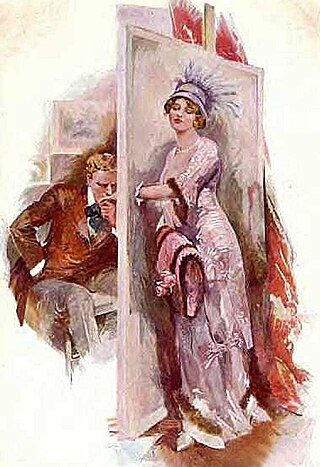
The Count of Luxembourg is an operetta in two acts with English lyrics and libretto by Basil Hood and Adrian Ross, music by Franz Lehár, based on Lehár's three-act German operetta Der Graf von Luxemburg which had premiered in Vienna in 1909. Lehár made amendments to his Viennese score to accommodate the two-act adaptation. He also interpolated into the score three new pieces: a waltz that he had written for a commemorative performance of Der Graf in Vienna; a song from his first operetta, Wiener Frauen; and a Russian dance from the opera Tatjana.

The Fortune Teller is an operetta in three acts composed by Victor Herbert, with a libretto by Harry B. Smith. After a brief tryout in Toronto, it premiered on Broadway on September 26, 1898, at Wallack's Theatre and ran for 40 performances. Star Alice Nielsen and many of the original company traveled to London, where the piece opened at the Shaftesbury Theatre on April 9, 1901, running for 88 performances. It was revived in New York on November 4, 1929, at Jolson's 59th Street Theatre, starring Tessa Kosta, and ran for 16 performances. The piece continued to be revived, including by the Light Opera of Manhattan in the late 20th century and the Comic Opera Guild in the early 21st century.

The Serenade is an operetta with music and lyrics by Victor Herbert, and book by Harry B. Smith. Produced by a troupe called "The Bostonians", it premiered on Broadway on March 16, 1897 at the Knickerbocker Theatre and ran initially for 79 performances. It remained very popular into the new century, running almost continuously for the next seven years.

The Vagabond King is a 1925 operetta by Rudolf Friml in four acts, with a book and lyrics by Brian Hooker and William H. Post, based upon Justin Huntly McCarthy's 1901 romantic novel and play If I Were King. The story is a fictionalized episode in the life of the 15th-century poet and thief François Villon, centering on his wooing of Katherine De Vaucelles, and relating how he becomes “king for a day” and defends France against the invading forces of the Duke of Burgundy.

Emma Trentini was an Italian soprano opera singer who came to the United States in December 1906.
Leányvásár is a Hungarian operetta composed by Victor Jacobi with a libretto by Miklós Bródy and Ferenc Martos. It was premiered on 14 November 1911 at the Király Színház in Budapest. It was adapted several times, as The Marriage Market in 1913 and Szibill/Sybil in 1914, both of which versions had several successful productions, and as Jack in Spanish.

Robert Craig Campbell (1878–1965) was a Canadian tenor who performed in operettas across Canada and the United States. Campbell recorded with the Columbia, Davega, Perfect and Pathé labels. Although a tenor, Campbell had a very rich voice and could also sing baritone, and described himself as a tenore robusto.
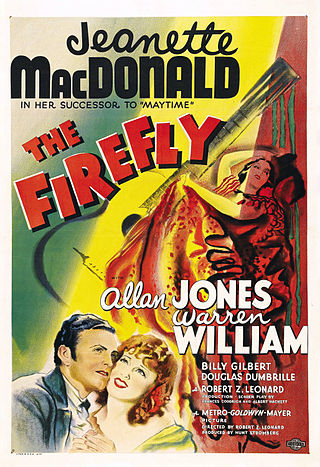
The Firefly is a 1937 American historical musical film directed by Robert Z. Leonard and starring Jeanette MacDonald, Allan Jones and Warren William. The film is an adaptation of the operetta of the same name by composer Rudolf Friml and librettist Otto A. Harbach that premiered on Broadway in 1912. The film used nearly all of the music from the operetta but jettisoned the plot in favor of a new storyline set in Spain during the time of the Emperor Napoleon I. It added a new song, "The Donkey Serenade", which became extremely popular, as was one of the Friml songs, "Giannina Mia". The original release prints of the film were elaborately tinted with Sepia-Blue, Sepia-Orange and Sepia-Blue-Pink.
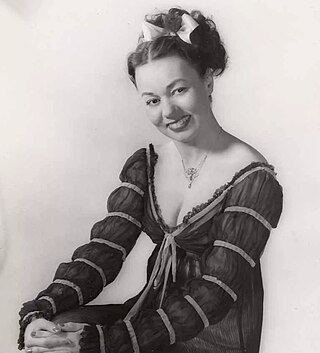
Helena Bliss was an American actress and singer. A talented soprano, she actively performed in musicals, operettas, and operas in the United States, both on stage and on television and radio, from the 1930s through the 1950s. She is best known for her portrayal of Nina Hagerup in the original Broadway production of Robert Wright and George Forrest's Song of Norway. She also appeared successfully in a few productions on London's West End.
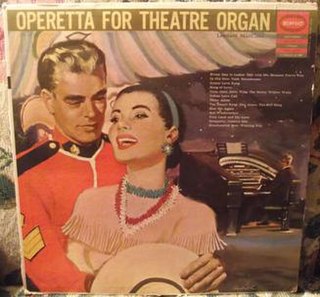
Operetta for Theatre Organ is an album released by Leonard MacClain in 1957 on Epic Records LP record LN 3372. On release, J. Albert Fracht reviewed the album as "full of good playing." The album features music from Victor Herbert's "Red Mill", "The Fortune Teller" and "Mlle Modiste." Also featured are songs from Sigmund Romberg's "The Desert Song" and "The New Moon". Rudolf Friml is represented by songs from "The Firefly", and "Rose Marie".
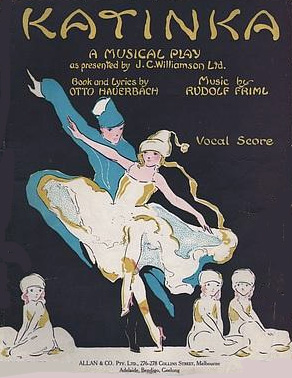
Katinka is an operetta in three acts composed by Rudolf Friml to a libretto by Otto Harbach. It was first performed at the Park Theatre in Morristown, New Jersey, on December 2, 1915, with May Naudain in the title role and subsequently received its Broadway premiere on December 23, 1915 at the 44th Street Theatre.

Wildflower or The Wildflower, is a musical in three acts with book and lyrics by Otto Harbach and Oscar Hammerstein II and music by Herbert Stothart and Vincent Youmans. The plot concerns a pretty Italian farmgirl, Nina, who has a fiery temper. She stands to inherit a fortune provided that she can keep her temper under control for six months. If she fails, the money goes to her cousin Bianca, who tries to provoke her. She manages to do it, and gets the money, as well as her man, Guido. Several of the songs were published, among which "Bambalina" and the title song were the most popular. The musical proved to be Day's last Broadway show before moving to London.

Baron Trenck is a comic opera in three acts loosely based on the life of Baron Franz von der Trenck. The original German-language work was composed by Felix Albini to a libretto by Alfred Maria Willner and Robert Bodanzky and premiered at the Stadttheater in Leipzig in 1908. The English version, adapted by Frederick Franklin Schrader and Henry Blossom, ran for just 43 performances at the Strand Theatre in London in 1911. It starred Walter Passmore, Walter Hyde and Caroline Hatchard.
Rosemarie Brancato was an American coloratura soprano who had an active performance career in operas, operettas, and concerts on the American stage and on American radio from the mid-1930s into the 1950s. She created the role of Madame Boticini in the original Broadway production of Fritz Kreisler's Rhapsody in 1944.


















